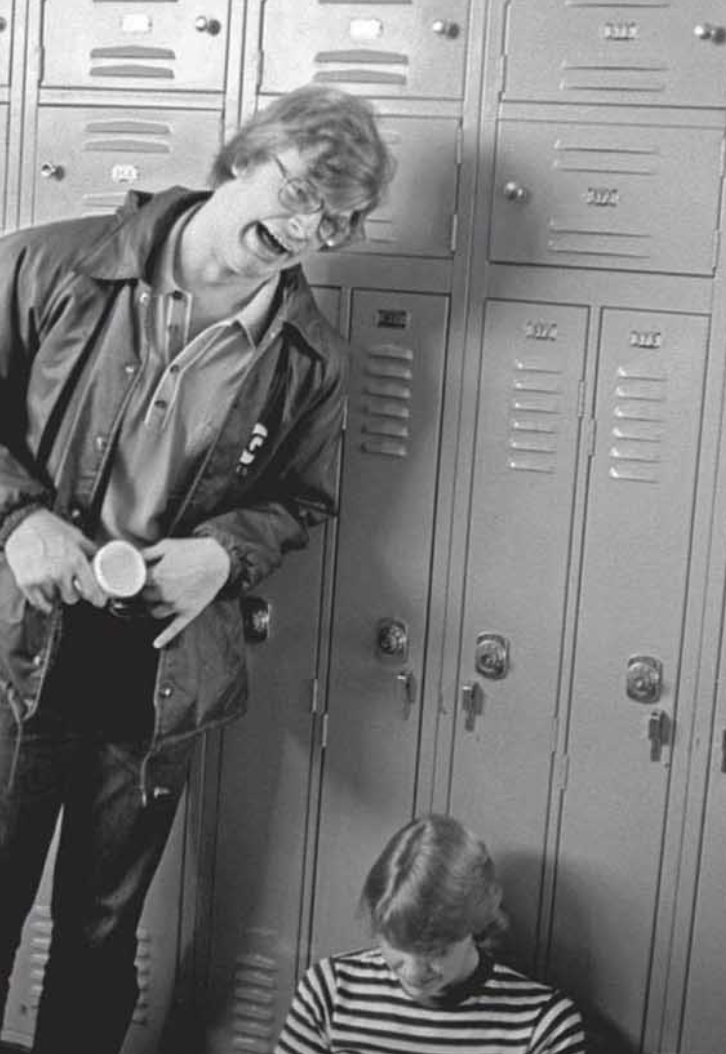Though serial killers are always ultimately painted as gruesome non-human caricatures when the body count tally finally gets publicized, there is almost always a backstory that sheds a project-level light on the why. In Jeffrey Dahmer’s case, a tense home life paired with strange urges constantly manifesting in the dismemberment and preservation of roadkill contributed to a tumultuous high school tenure. There to observe some of it both from afar and later as a friend was award-winning cartoonist John “Derf” Backderf (Alex Wolff), who wouldn’t befriend Jeff until their senior year, when the formerly shy student began impersonating people with epilepsy and Bell’s palsy at random moments in the hallways of Revere High, which Backderf found to be “hilarious.”
Directed by Marc Meyers and starring ex-Disney golden boy Ross Lynch in his first “adult” role (it worked for Selena Gomez in Spring Breakers), My Friend Dahmer gives us the sentimental portrait of a serial killer we didn’t know could make us feel sorrow for someone who ended up murdering seventeen men (that were provable, anyway). Based on Backderf’s graphic novel of the same name, the unique perspective that comes from someone who knew him in a pure and unbiased way lends plenty of pathos to this film.
Forming the Dahmer fan club with his two other friends, Neil (Tommy Nelson) and Mike (Harrison Holzer), John feels that as a quartet, they have the potential to “really disrupt the school” during their final year. What he ultimately means, however, seems to pertain more to relishing Jeff make a spectacle of himself, eventually even paying him to do his “performance” at the local mall, where his perpetual state of drunkenness only adds to the cringeworthy scene.
His one source of catharsis–his true great pleasure–is ripped from him when his father, Lionel (Dallas Roberts), decides that his morbid fascination with dismantling animal body parts in a shed in the woods has got to stop. After tearing down the shed, Lionel presents Jeff with two dumbbells as a consolation, explaining, “I see things in you that I don’t like about myself. I want you to have friends in ways that I never could.” But Dahmer’s feeling of “acceptance” by his newfound group wears away rather quickly as he starts to feel more like a curiosity–an on-demand jester. Instances when he does still hang around them find him disappearing into the background, musing, “I wish I had a best friend.”
The neglect at home only continues to intensify, with his mother Joyce’s (Anne Heche, always ideal for the crazy broad roles) dependence on prescription drugs and greater attentiveness to her youngest son, David (Liam Koeth), serving as yet further confirmation to Jeff that he is uncared for. It is while on a school trip to D.C. during which Jeff finagles a meet and greet for himself and his crew with Walter Mondale that Lionel decides to move his things out of the house.
As his graduation and eighteenth birthday loom, Jeff feels an oppressive shackling to loneliness as opposed to the entailed freedom that ought to come with this new period in his life. All the while, his lust for a jogger–later revealed to be Dr. Matthews (Vincent Kartheiser, Pete Campbell no more)–gnaws at the threshold between mere animal torturer and potential full-fledged murderer.
Of course, some might take offense at My Friend Dahmer‘s very effective humanization of a man unequivocally branded a monster. And even Dahmer himself said, “I feel it’s wrong for people who commit crimes to shift the blame onto somebody else, onto their parents or onto their upbringing or living circumstances. I think that’s just a copout. I take full responsibility.”
But as his pre-serial killer self tries woefully to remind John, “I’m just like anybody else.” This does nothing to appeal to John’s empathy as he gets ever antsier to peel out of the driveway in horror at not only the sight of unexplained blood on his friend’s hand but a dark and empty house that mirrors Dahmer’s own abandonment. It was this very fear of being left once again by those who were supposed to love him that undoubtedly led to his sedation of his victims, followed by their killing and a light hangout session with the corpse in either his bedroom or living room. His craving for total control and possession over a body is a direct result of the lack of control and affection he received in his adolescence. In effect, perhaps there should be a section in parenting books about the ramifications of neglect citing Dahmerdom as an eventual result.





















